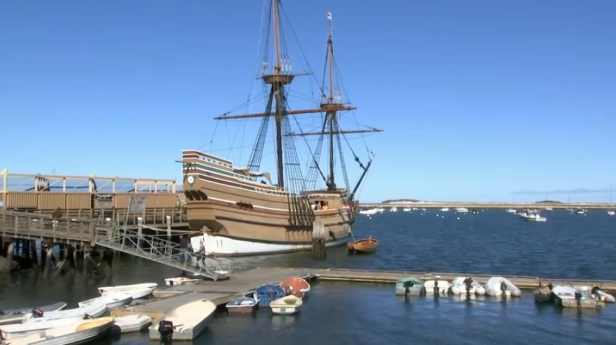
A first-hand account of the first permanent European colony in New England, including the fall harvest meal that inspired America's Thanksgiving tradition, has been reprinted for a wider audience as Massachusetts marks 400 years since the arrival of the Pilgrims on the Mayflower this year.
Massachusetts' State Library and Plimoth Patuxet Museums (formerly Plimoth Plantation) are unveiling on Thursday a new printed version of the historical account of Plymouth Colony by William Bradford, a Mayflower passenger and the English colony's longest serving governor.
The organizations said it's the first time Bradford's handwritten manuscript, entitled "Of Plimoth Plantation,'' has been put into print since 1896.
Revisiting Bradford's words in his own hand is a unique way of marking the Mayflower anniversary during a challenging year, said Thomas Begley, who edited and managed the project for the museum.
Many public celebrations of the seminal voyage, including the recent return of the restored replica of the Mayflower to Plymouth, were tempered by the pandemic, which has hit Massachusetts particularly hard.
"It's like hearing Elvis on vinyl. It brings that same level of authenticity,'' he said. "A lot of people are already familiar with this history, but many of us don't know ho w we know this history.''
Bradford, who served as the colony governor from roughly 1621 to 1657, wrote the account over twenty years, starting in 1630.
The handwritten journal recounts the Pilgrim's famed sea voyage and details life in the early years of the colony, including an account of the Thanksgiving meal between the Pilgrims and the Wampanoag people. It also includes the colony's famous governing document, the Mayflower Compact, as well as a list of Mayflower passengers.
The manuscript was lost during the American Revolution, presumably removed from the Old South Church in Boston by British soldiers during the American Revolution, according to the State Library.
It turned up almost a century later in 1855 in the library of the Bishop of London in England. It was returned to Massachusetts in 1897, where it has been one of the crown jewels of the State Library collection.
Begley said the reprint effort drew on high-resolution digital images of the original manuscript made by the State Library in recent years as part of its conservation work.
The result is a reprint that showcases the work much in the way Bradford originally wrote it _ including his scribbles, scratches and cross-outs. The new edition's pages are even cut to the same size as the original manuscript.
"We're fortunate he had such great handwriting,'' Begley said. "It's amazing to think it's a 400-year-old book. Some parts of it look like it was written yesterday. They're crystal clear.''
The organizations are hosting a virtual book launch Thursday evening, and will be making the book available at Plimoth Patuxet's gift shops and its website.



